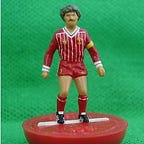Lost in Transit
The Story of Hugo Enyinnaya
“I’m going to be rich!” was the typically honest reply of Antonio Cassano when asked what went through his mind after scoring a fantastic goal against Inter as a 17 year old, upon making his first start for Bari in 1999. As crass as such a comment might seem, it was, perhaps, only natural for Cassano to react that way, having been raised in one of Italy’s most impoverished and tough neighbourhoods. As things turned out, though, it was quite a prescient thought. Cassano may have never fulfilled his early promise or achieved as much as he might over the last eleven years, but this player has certainly done pretty well financially for himself.
He was also probably not the only one whose thoughts turned to the promise of potential fortunes that night. Playing alongside Cassano and scoring an equally brilliant goal was another teenage striker in the form of Hugo Enyinnaya. Signed from the Belgian second division club Molenbeek a few months earlier for £125,000, the Nigerian might have been forgiven for thinking that his life was about to change dramatically when his shot from thirty yards out flew past Angelo Peruzzi to give Bari the lead.
But it didn’t. And while Cassano quickly established himself as a regular in Bari’s starting line-up, a series of injuries crippled Enyinnaya’s chances of a lengthy career. In three season he made just twenty appearances without ever managing a lengthy run in the first team. Loans to Livorno in the Serie B (which resulted in two goals in seventeen appearances) and Foggia in the Serie C1 (from which he returned one goal in seven appearances) followed but when his contract was up there was no one willing to offer him a new one. At just twenty three years of age, Enyinnaya’s Serie A career was effectively over.
Yet not everyone had forgotten about him. The former Udinese midfielder Marek Kozminski, who had just taken over as chairman at Polish side Gornik Zabrze, still remembered the Nigerian with the fierce shot and decided to make an offer for him. An offer was also received to join Hungarian side Debrecen, but Enyinnaya wasn’t convinced of the merits of this move. Agents promised him contracts with Italian sides but as the weeks dragged on, none of those promises materialised. So Enyinnaya decided to go to Poland.” They pay as well as they do in Italy and it will be in the top flight,” he said at the time, “It won’t be too bad”.
Sadly, that wasn’t the case and his story was about to take a turn for the worse. The contract that he signed was written exclusively in Polish, and which — whether intentionally or not — prevented Enyinnaya from noticing that the €10,000 a month that he had agreed to wasn’t mentioned anywhere. When he tried to get paid he was met with excuses. When he played he was pelted with bananas. After a couple of months he had, unsurprisingly, had enough and he left the club having made just four appearances for them.
Friends and agents were all contacted as he desperately tried to find a new club in Italy. Yet it all turned out to be in vain. There were no Serie A or B teams interested in giving him another opportunity, whilst clubs lower down the Italian league system were prevented from signing an ‘extracomunitario’ (a player from outside Europe). For Enyinnaya there was no going back. So he stuck it out in Poland making moves to Poland II Liga Lechia Zielona Gora and Odra Opale. Finally free from injury, he began scoring freely notching up thirty goals in some eighty games.
Eventually he did make it back to Italy, joining Anziolavinio in the Eccellenza (non-league) where the ban on non-Europeans didn’t apply. Within months he moved on to Meda and then Zagarolo. Always struggling to play and show a glimpse of that early promise, he finally gave up this year at the age of thirty and chose to return home to Nigeria. “I thought that after that day nothing would have been the same for me,” he says of that game with Inter struggling to mask his bitterness. “Especially as everything in my life before had sucked. They said that he [Cassano] would become like Maradona so I wanted to be at least like Careca”.
Instead, that game and that goal against Internazionale turned out to be the highlight of his career. “People ask me ‘Hugo, how’s Cassano’, as if I had remained the same as that young player”, he later said, “I’ve got no contact with Cassano, I don’t hear from him. In these years I’ve got through situations that have left their mark. My story was different from Cassano’s. Our paths were different.”
Paul Grech is writing more calcio stories like this one to be published in an e-book later this year. Subsribe to the Il Re Calcio newsletter to keep informed on this.
Photo from an Egypt vs Algeria game by Muhammad.
